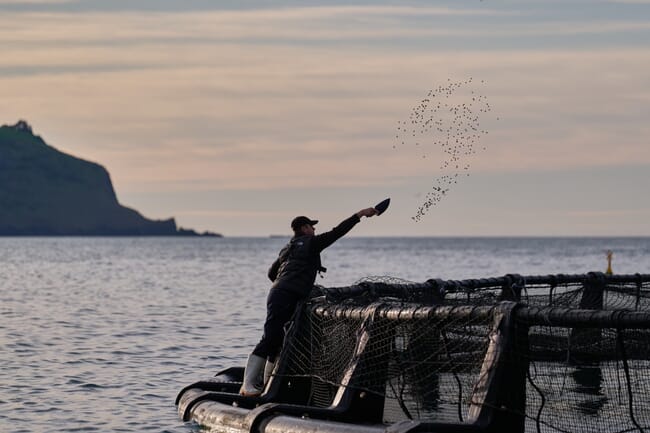
Akaroa King Salmon is adopting the novel feed programme to align with its values of sustainable production © Akaroa King Salmon/BioMar
BioMar’s Blue Impact feed programme, through which the company aims to reduce the reliance of the aquafeeds industry on wild-catch fisheries, uses alternative ingredients such as algal oils, fish trimmings, and insect meal to replace traditional ingredients.
Akaroa Salmon, a partnership that includes Ngāti Porou, Ōnuku Runanga - the mana moana (or guardians) of Akaroa Harbour - and the founding Bates family, was an early adopter of this technology. The partnership trialled the use of algal oils in aquafeeds, achieving remarkable results which led to them winning the NZ “Future Adaptation” award in 2023.
“When I first started farming salmon in Akaroa Harbour, almost four decades ago, the feed ingredients essentially relied on wild caught fish as the raw material, and we fed up to 3kg of wild fish to grow 1kg of farmed salmon. Clearly, this wasn’t a sustainable practice,” said Duncan Bates, founder of Akaroa King Salmon, in a press release.
“With the introduction of Blue Impact, Akaroa King Salmon have started our journey to become a positive fish protein producer, a far cry from those days long ago and a testament to our ongoing aspiration to become a truly sustainable food producer. I am particularly excited to use novel ingredients like insect meal, utilising waste streams previously going to landfill,” he added.
The Blue Impact feed programme relies on the use of three main parameters to assess a feed’s impact: forage fish dependency ratio, percentage of circular and restorative raw materials, and carbon footprint. This concept requires utilising innovative novel ingredients such as insect meal, regenerative agricultural products, and trimmings from seafood processing in ascending levels of inclusion in each successive version of the feed.
“Companies like Akaroa who are dedicated to sustainability and utilising more circular and restorative ingredients are necessary for future-proofing the aquaculture industry. Using sustainable novel ingredients is essential for decoupling feed and food supply chains and provides novel ingredient producers the confidence to invest in R&D, upscaling, and commercialisation, increasing the availability of these ingredients industry-wide,” commented Mike Thompson, commercial director at BioMar Australia.




